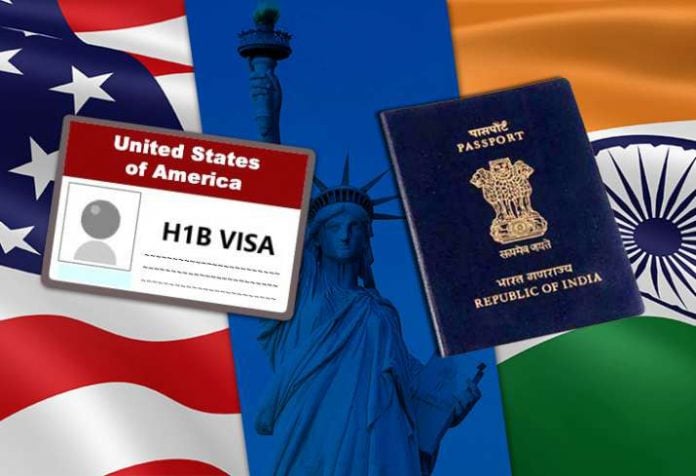
President Donald Trump’s decision to temporarily suspend new work visas has led to critics warning him that this would hold the US back and put its global competitiveness at risk
By Kenneth Tiven
The Trump Administration has spent three and half years deconstructing immigration to the US as a major aspect of its “America First” approach to political leadership. Its latest move has been to suspend new work visas—basically H-1Bs—which bring thousands of skilled people—many from India to the US. The suspension lasts until the end of the year. Court challenges are difficult because the president has by law unusual control over immigration.
Those already here on H-1B visas can file for an extension, which costs $370 per application. Business organisations have been aware of Trump’s decision to halt new visas and fought it, obviously unsuccessfully. Stephen Miller, the immigration adviser, argues that the coronavirus pandemic caused the economic collapse in the US, making it critical for these jobs to go to Americans. Business recruitment experts say workers from other countries fill jobs that Americans are not willing to do or are not capable of performing.
Ironically, Trump’s various business interests have regularly benefitted from these visas. The US Department of Labour files for Mar-a-Lago and two golf courses from the start of 2016 through the end of 2017 show that his hiring managers said they were able to find and hire only one qualified American worker—a cook—for 144 open positions. Seasonal workers on H-2B visas took the other 143 jobs.
With the hospitality business—hotels, golf, travel—in stupendous decline, Trump’s hotels may not need so many workers this year. For the president, this action is comparable to many others where the underlying rule is “do as I say”, not what I actually do.
The order applies to the following category of visas—H-1B, H-2B, H-4, L-1 and certain J-1s. H-1B visas are used for skilled workers and are used widely in the tech industry. It has brought thousands of skilled Indians to work in the US. H-2B visas apply to seasonal workers; H-4 visas are given to spouses of H-1B visa holders; J-1 visas are given to researchers and scholars, while L-1 visas are used for executives transferred to the US from positions abroad with the same employer.
The anti-immigration mindset of this Administration is such that it may never have considered the need for skilled workers, researchers and scholars in the middle of a pandemic and economic disaster.
Naturally, this move has attracted wide criticism. “Putting up a ‘not welcome’ sign for engineers, executives, IT experts, doctors, nurses and other workers won’t help our country, it will hold us back,” said Thomas Donohue of the US Chamber of Commerce.
“This is a full-frontal attack on American innovation and our nation’s ability to benefit from attracting talent from around the world,” said Todd Schulte of FWD.us, a pro-immigration advocacy group for big tech companies.
Sundar Pichai, CEO of Google tweeted: “Immigration has contributed immensely to America’s economic success, making it a global leader in tech, and also Google the company it is today. Disappointed by today’s proclamation—we’ll continue to stand with immigrants and work to expand opportunity for all.”
In a statement, Amazon said that “preventing high skilled professionals from entering the country and contributing to America’s economic recovery puts American’s global competitiveness at risk”. Facebook said that “highly-skilled visa holders play a critical role in driving innovation and that’s something we should encourage, not restrict”.
Twitter chairman Patrick Pichette, a Canadian, took a different approach: “A message to all you H-1B seekers; just look to the North, where we welcome you (and your family) with open arms.”
The Trump Administration’s leadership on Covid-19 has been criticised by political and civil society organisations for being late and lame. In the last month or so, the pandemic is picking up speed in geographical areas that didn’t take it seriously enough at the start. This casts doubt on the wisdom of early reopening efforts crucial to Trump’s claims for economic performance. There are nearly 40,000,000 people currently unemployed or under-employed because of efforts to combat the disease.
In the three months since admitting that Covid-19 is a problem, Trump has halted refugee resettlement, deported unaccompanied children fleeing violence and abuse, suspended some categories of legal immigration, closed the border to asylum-seekers and repeatedly pushed back court hearings for people awaiting them in Mexico.
Are these policies necessary to prevent the spread of covid-19 and to protect American workers from competition for jobs during the pandemic-related financial crisis? Actually, most of these immigration policies have been on the president’s to-do list since his first year in office.
The pandemic didn’t create a need for nativist immigration policies; it simply provided an excuse for them. Trump never hid his desire to blame other countries and close off US borders.
Meanwhile, several election indicators have turned negative on Trump. His campaign held its first arena-style rally in Tulsa, Oklahoma recently but fizzled out with modest attendance. Trump faced as many empty blue seats as red-hat fans. Two defeats in Supreme Court cases that Conservatives thought they’d win have left the Republicans wondering if their man is in trouble. When angry, he lashes out and this immigration change seems to be a distraction that appeals only to his diehard supporters.
—The writer has worked in senior positions at The Washington Post, NBC, ABC and CNN and also consults for several Indian channels
Lead Picture: India TV

